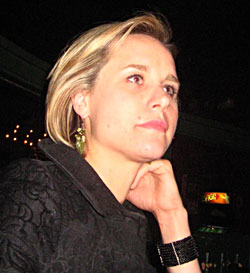
| Jacket 38 — Late 2009 | Jacket 38 Contents page | Jacket Homepage | Search Jacket |
This piece is about 2 printed pages long.
It is copyright © Virginia Konchan and Jacket magazine 2009. See our [»»] Copyright notice.
The Internet address of this page is http://jacketmagazine.com/38/r-seed-rb-konchan.shtml
Ian Seed
Anonymous Intruder
reviewed by
Virginia Konchan
Shearsman Books Ltd, 2009 ISBN: 978-1-84861-028-6
^
A place-based poet Ian Seed is not; Anonymous Intruder is a collection that engages with the politics of dislocation, in the profoundest sense. Even the book’s structure reflects this: the first two sections are composed of longer poems of varying stanza lengths, while the last section, “Shadows,” is composed entirely of prose-poems. The “intruder” alluded to in the title is a stranger too ghostly to be named, yet one who regularly beseeches the speaker with his or her plight: “Winding/ streets have brought you here/ and now you have forgotten/ the way home. You sob/ like a child to be allowed in.” The communication between these two figures—the shadowy muse and speaker—creates a moving dialogue of loved and beloved, or Dickinson’s soul and master thereof: “Did you know/ I would grow tired of waiting before you/ grew tired of watching?” the speaker of “Two Old Heads” asks. Earlier in this poem the addressee’s personal history is presented as a scourge: “Meanwhile the days pass. It’s snowy/ and foggy. If your father is an executioner,/ his face all lit up, how do you translate this/ into family terms?”
^
Seed, founding editor of Shadowtrain books and webzine, is a U.K. writer, and his poetic inheritance, throughout Anonymous Intruder, seems less marked by the riptide influence of Language Poetry over the last thirty years than his American contemporaries. While interrogating the loss of genuine emotion, the speaker’s wanderings feel actual rather than imagined (another guiding characteristic in contemporary poetry, wherein the landscape of the mind is held to be paramount to the landscape in which one lives).
^
The voices in Anonymous Intruder are trapped in a world of their making, yet still fully conscious and capable of volition: the scenes do not inscribe so much a limbo state as the tentative forging of a path. “Concentrate on the architecture,/ not the illness, things to make/ and mend. Yet it’s difficult/ to know where you are when/ the concision of guides only adds/ to the feeling of lostness.” This line is from the collection’s opening poem, “The Familiar Dead,” which recalls Whitman, and also Robert Lowell, to mind. The journey the speaker describes to the reader is one through “thick grey air, a face without a name at the end of it,” and the challenge is defined as tracing shadows back to their “vital source,” and skirting around those who refuse to leave their posts as night-of-the-living-dead-sentinels. The specificity of touch, in this collection, offers not the solace of eros, but concrete instances of the individual’s alienation from the collective: “On the crowded tram,/ the accidental/ touch of a hand is enough/ to pinpoint your loneliness.”
^
The book’s unfolding drama is one of accepting a fragmented reality as the only reality: to “heal the situation as it is,” and touch continues to figure as violation: “The money he offered for/ the job was good . . . When I shook hands with him, it was like being/ penetrated. Never had I felt so alone.” When the longed-for figure of restoration arrives, it is a broken figure, “bleeding from the nose.” Hope, here, takes the form of a pattern discerned amid the chaos of exhaustion: “ . . . still the childlike searching in/ your eyes for something beyond proximal and distal powers, no/ pattern discerned, though occasionally scattered words begin a/ new language, a nudge in the right direction.”
^
The dream of fording past the impossible life to the possible life, throughout the book, fuels the speaker on. If lyric poetry is defined as a sense of preciousness in the face of death, the task of postmodern lyric poets such as Ian Seed is two-fold: the original difficulties inherent to lyric poetry, coupled with the ironization of the core romantic vocabulary (the second associative meaning of “precious,” being “sentimental,” and the secondarily accrued meanings of “sweet” and “sick” both implying varying degrees of impressiveness). The word beauty, however, has remained immune from these appropriated thefts; beauty, in Seed’s debut, never loses its power, and is everywhere pressing, active. In Anonymous Intruder, the reader is asked not to merely admire beauty, but the equally riveting phenomenon of its vanishing:
^
At the roadside the body covered by a sheet,
just a few strands of hair in the breeze
brightness in the waving field
Can something so beautiful really burn

Virginia Konchan
Virginia Konchan’s poetry, criticism and translations have recently appeared or are forthcoming in The Believer, The New Republic, Michigan Quarterly Review, Rain Taxi, A Trunk of Delirium and elsewhere. She is also a contributing reviewer to ForeWord Magazine.